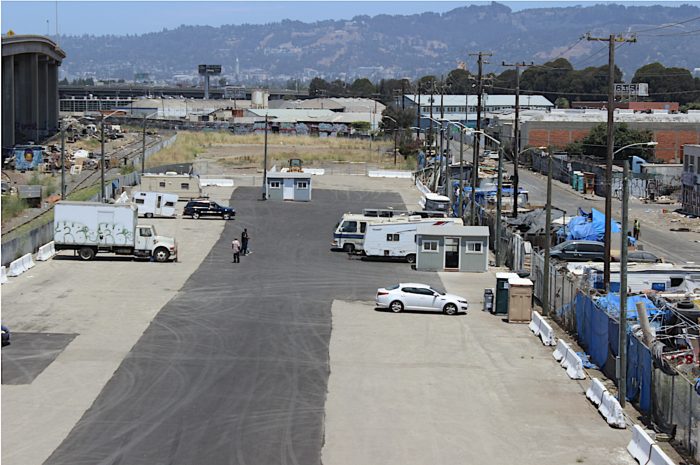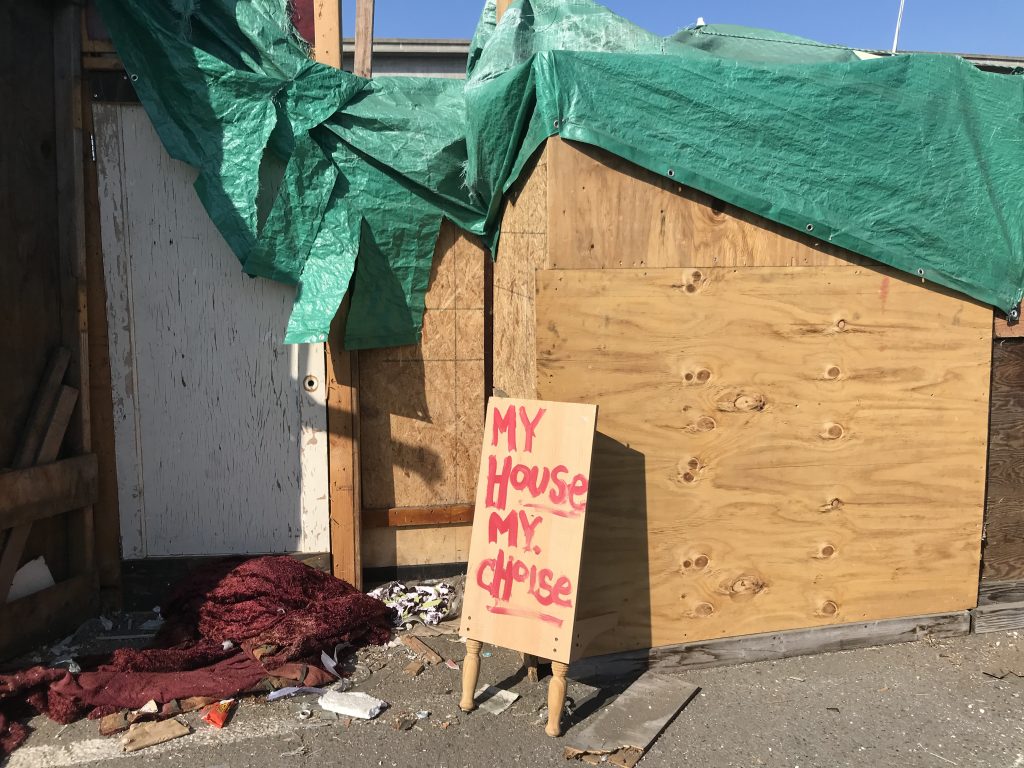
On July 7, the Berkeley-based non-profit Building Opportunities for Self-Sufficiency (BOSS) opened a site on Wood Street, sanctioned by the City of Oakland, for people to legally park and reside in RVs or trailers while having access to electrical hookups, fresh drinking water, and portable toilets. It sits just west of Wood Street, in West Oakland, and in the middle of a large community of homeless people. The site had been planned since 2019, but took over two years to open, in part due to protests and an occupation. At the end of July, 11 people had moved into the site, according to a BOSS employee. City of Oakland public information officer Autumn King said the site could accommodate 40 total RVs or trailers. Some homeless residents who live nearby have shared concerns about their ability to access the site, skepticism that it would meet their needs, and worries that it could displace those in their community who are not able or interested in moving to the site.
The struggle to open the site
In June of 2019, Oakland’s Mayor Libby Schaaf announced plans for the city to sanction the opening of a safe parking site near Wood Street, saying the site would open “in the coming months,” but the project soon faced delays. In early November of that year, Oakland oversaw a two day clearance of a 1.5 acre parcel of land just west of Wood Street in order to make the land available for a non-profit to open the site. City workers and a contracted towing company moved vehicles, both inhabited and abandoned, off of the parcel, along with possessions and trash. Oakland’s Police Department also asked people to leave the property with their possessions, but faced resistance from a group of over 35 protestors who held signs and chanted.
Protestors at the time expressed concern that residents would not be able to access the site, which would only be available to vehicle dwellers, as many residents who lived on the site did not live in vehicles. Protestors also claimed those who did live in vehicles were not given written guarantees from the city that they could return once the safe parking site was constructed.The protestors included residents of the property and their supporters, many of whom were members of The United Front Against Displacement, an anti-gentrification group. Some residents brought their dogs to the protest.
“A bunch of people showed up with a bunch of people from the camp,” said Puffy, a homeless resident who lived on the parcel at the time, in an interview from last year. “And the dogs started barking and those big burly cops didn’t want to fuck with the people or the dogs. So they left.”
After the protest, a handful of residents remained on the property. The corporation who owned the parcel, Game Changer LLC, then filed a lawsuit against the remaining residents. Eventually Game Changer won a legal battle that forced the County of Alameda to evict the remaining residents off of the land, but, in part due to delays related to the COVID-19 epidemic, the process took about a year, and the eviction was not executed until November 2020.
During that year the handful of residents remained on the parcel, and the safe parking site was not constructed. In July of 2020, released emails between members of Oakland’s City Administration, City Council, and Game Changer’s lawyer, Patricia Smith, showed the company planned to lease the land to the city for a dollar a year to allow a non-profit to use it for a safe parking site. A proposed lease in an email that Oakland’s City Administration sent to Smith led some to believe, increasingly, that the site’s construction could displace residents.
The lease quoted the City of Oakland Geographic Emergency Shelter Intervention Policy, and stated that one goal for such a parking site is “alleviating the impacts encampments have on the surrounding community.” It also stated that when such sites open “the city determines an area surrounding the site that is considered an invitation zone,” where those living nearby are invited to participate, but that once the site fills up “the invitation zone becomes the closure zone and enforcement is used to remove or prevent the return of any encampment in that area.”
The parcel for the proposed parking site sits in the middle of a community of homeless residents who live on land owned by Oakland or CalTrans. While no one knows exactly how many people live there, and the population often changes, recent articles in The San Francisco Chronicle and The Guardian suggested the population to be in the hundreds. While residents and supporters worried that many members of this population who could not access or were not interested in accessing a safe parking site would be evicted from the area. It was also unclear what would happen to residents living onsite after the lease ended. A recent public records request shows that Game Changer could end the lease with Oakland as early as mid-November of next year, although the company also will have the option to agree to extend the lease for six months if the city requests it. In November 2020, about 60 advocates and residents showed up to protest Alameda County Sheriffs evicting the handful of people who still remained on Game Changer’s land. Some protestors locked arms in front of the entrance to the gate, delaying the sheriffs’ work. While all residents left the tract of land, their property remained onsite and some returned later in the day.
After some residents continued to refuse to leave, and another smaller protest, Game Changer agreed to a settlement with the residents. Several residents received about $2,200 each on the condition that they leave, while another received a large storage unit and yet another received a trailer to live in. With the land cleared of occupants, the city signed a lease with Game Changer LLC to use the land, and eventually contracted with BOSS to open the site, although that process took an additional eight months while the parcel sat vacant and fenced off.
Now opened, some residents fear eviction and are skeptical of the site
I interviewed six residents who live near the recently opened safe parking site. One of them, Puffy, is in the process of moving into the site but is pessimistic about it.
“I don’t want to move in there,” he said. “But I pretty much don’t have a choice.”
While pointing to an area where homeless people live along Wood Street, he said “They can’t have this in a photo op. When it’s open and going, everybody around here is going to have to go.”
The City of Oakland has not posted any eviction notices near the safe parking site recently. Janis Mara, a spokesperson for CalTrans, said that agency has not currently scheduled any clearances for the Wood Street homeless community. But residents are still worried.

Another resident, who asked not to be named because they fear being excluded from the site, had been evicted by the City of Oakland and CalTrans in the past, and is considering moving into the safe parking site. The resident is hesitant to move to the site, but seeks security from eviction.
“I don’t want to lose what I’ve established here as my home,” he said. “I’ve gotten used to the area and the community we’ve developed here. But the site is a place where you don’t have to worry. There’s this constant threat of eviction looming over my head.”
Ramona Mason, who lives on CalTrans owned land near the site, said she would not move to the site because she believes it would not allow her to bring her dogs. Another resident, who asked not to be named because he wants to maintain a good relationship with those who operate the site, said he was surprised that no one had approached him about the site since he lives right outside its gate. He stays in a self-made home.
“I would absolutely consider moving there,” said Gill Vasquez, who lives in an RV near Wood Street. “But no one’s reached out to me. What I would like to see is them notifying people, letting us know if there’s an opportunity for us to have a space.”
Vasquez also noted that a portion of land next to the Safe RV Parking site was left vacant and fenced off. He wondered why the safe parking site did not include that portion of land. County records show this area is part of the same parcel the city is leasing from Game Changer LLC. It makes up about a third of the total parcel. When asked if the city had plans for this portion of the parcel, Oakland public information officer Autumn King said, “there are no finalized plans for the other side of the site at this time.”
Puffy claimed that when he agreed to move to the site, representatives from BOSS told him he could not cook and that only one person was allowed to live in each RV or trailer, although they would allow one visitor per day.
“They expect you to eat their food and you can’t live with your girlfriend or boyfriend,” he said.
BOSS has not responded to emailed questions including a request to share the list of rules they ask residents of the site to follow. Puffy said he was not given a copy of the rules.
One resident, who asked not to be named for fear of retaliation from the city or CalTrans, said the site would not offer them anything they did not already have. They noted that many residents had already figured out how to access electricity and water from nearby sources.
“What can they offer me except more rules?” they said.
A version of this article originally appeared in The Oakland Post and on the Post News Group’s website at the beginning of July. The article has been updated to reflect current information.
Zack Haber is a poet and journalist who lives in West Oakland.
